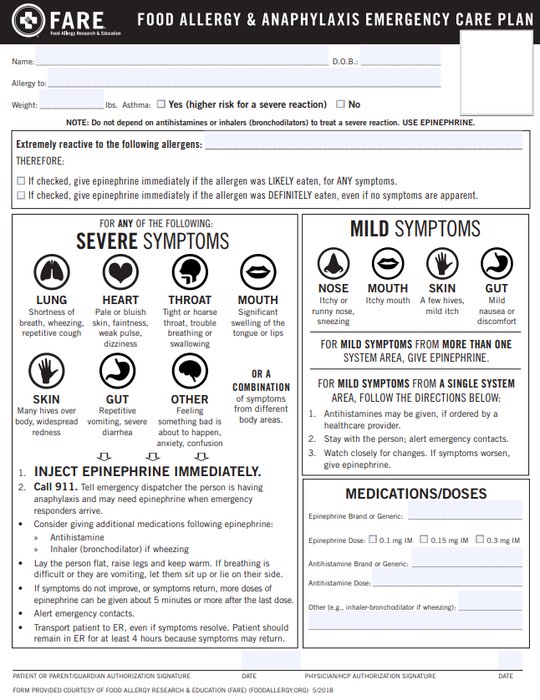Dealing with a Child’s Food Allergies
- Category: Health
- Published: Wednesday, 30 August 2023 21:10
- Joanne Wallenstein
 (Submitted by Debra Etelson, Pediatrics at White Plains Hospital.)
(Submitted by Debra Etelson, Pediatrics at White Plains Hospital.)
Many parents and guardians, especially those with children going to daycare or school for the first time, are understandably concerned about whether the facility, its staff, and its other attendees are taking proper precautions when it comes to food allergens.
The good news is that any reputable, licensed establishment – by law – must do so. But that does not necessarily mean that one’s anxiety can simply be put away.
According to the nonprofit Food Allergy Research and Education (FARE), about 8% of children under the age of 18 have food allergies – equal to one in 13 children, or approximately two in every classroom. Eggs, milk, and peanuts are among the most common causes of food allergies in children, with wheat, soy, and tree nuts also included. Fish and shellfish are also on the list, though of course those are rarely served in schools or daycare centers.
Determining what foods your child may be allergic to can be complicated, but it needn’t be. Obviously if the child  suddenly has trouble breathing, or experiences cramps, swelling, vomiting or diarrhea, a trip to the emergency room is necessary. But before such symptoms occur, a simple blood test or a scratch test performed by an allergist can raise the appropriate red flags.
suddenly has trouble breathing, or experiences cramps, swelling, vomiting or diarrhea, a trip to the emergency room is necessary. But before such symptoms occur, a simple blood test or a scratch test performed by an allergist can raise the appropriate red flags.
Research has shown that children may outgrow some of these allergies before they’re five, although allergies to peanuts, tree nuts, fish and shellfish are usually lifelong.
Follow-up tests for someone who does have a food allergy usually take place every one to two years, and pediatricians will review allergies at each visit to track any changes. If the child has outgrown an allergy, there may be whole new edible worlds for them to explore – liberalizing a kid’s diet can be amazing.
Some food sensitivities and/or allergies may not be immediately apparent. Hives or tongue-swelling may occur when eating certain fruits and vegetables, but those reactions rarely progress to something more serious. You may see a reaction to raw carrots or apples, but not cooked ones, as cooking reduces the allergenic proteins and thus lowers the impact they have on the immune system.
When Kids Are in Someone Else’s Care
It may be relatively easy to monitor your child’s food intake at home, but what if they’re off to school or a playdate? Schools require the completion of a food allergy sheet like the one below before the term begins. This, along with a supply of Benadryl and/or an EpiPen, should help ease fears about your child being away for the day. In addition, many schools now prohibit peanuts and some other allergy-producing foods from the premises, eliminating the chances of an airborne infection.

Similarly, if your child is going to another home where you will not be present, converse with that caregiver and provide the appropriate medications. In all cases, remember that EpiPens are effective for 12 to 18 months, and like any other medication, will likely require a refill/replacement somewhere down the line. Also keep in mind that as your child ages, they begin to seek more independence, generally when they’re 10 or 11. That means they may don’t always carry their EpiPen or medication with them, so take the time to explain the importance of responsibility (and not just in this area of life!).
The FDA’s Pulmonary-Allergy Drug Advisory Committee (PADAC) voted 16-6 in favor for adults, and 17-5 in favor for children (under 18 years of age and weighing 66 or more pounds), acknowledging that available data supported a favorable benefit-risk assessment for neffy in the treatment of severe allergic reaction (Type 1), including anaphylaxis, for adults and children who weigh more than 66 pounds.
 Taking care of a child with a food allergy can be challenging, but being aware of what’s available and discussing the issues frankly with a pediatrician and other caregivers in your kid’s life should take at least a little worry out of the equation.
Taking care of a child with a food allergy can be challenging, but being aware of what’s available and discussing the issues frankly with a pediatrician and other caregivers in your kid’s life should take at least a little worry out of the equation.
Dr. Debra Etelson is a board-certified pediatrician at White Plains Physician Services in Somers. To make an appointment, call 914-849-7075.
Health Matters
The original version of this article was published in Health Matters, a White Plains Hospital publication.






